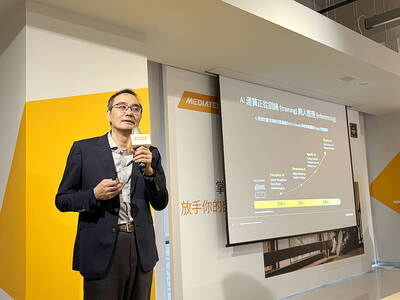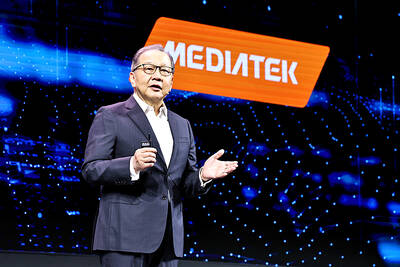Taiwan would work with the US and Japan on a proposed cooperation initiative in response to Beijing’s newly announced rare earth export curbs, Minister of Economic Affairs Kung Ming-hsin (龔明鑫) said yesterday.
China last week announced new restrictions requiring companies to obtain export licenses if their products contain more than 0.1 percent of Chinese-origin rare earths by value.
US Secretary of the Treasury Scott Bessent on Wednesday responded by saying that Beijing was “unreliable” in its rare earths exports, adding that the US would “neither be commanded, nor controlled” by China, several media outlets reported.

Photo: AFP
Japanese Minister of Finance Katsunobu Kato yesterday also voiced concern over the latest export controls, emphasizing the importance of coordinated action among G7 nations, Bloomberg News reported.
Beijing’s restrictions would have only an indirect impact on Taiwan, as it neither mines nor refines the materials itself, but imports most rare earths from Japan and most equipment from the US or Europe, Kung said.
As the US and Japan have proposed cooperation initiatives to address the situation, Taiwan would work with them if needed to ensure the stability of the local supply chain, he said.
Taiwan would also assist manufacturers in refining the material from discarded electric appliances, he added.
Before the curbs were announced, the government had already been planning to promote a circular economy program with the Ministry of Environment, Kung said.
While the ministries had originally scheduled the initiative for 2028, they have decided to move it up to next year, he said.
The ministry had expected the plan to meet one-third of domestic demand — about 1,500 tonnes per year — by 2031, but as the situation has become more urgent, it has decided to move that target to 2030, he said.
As the Industrial Technology Research Institute already has related technology and can refine at a kilogram level in laboratories, the ministry plans to scale up capacity and transfer the technology to corporations and manufacturers, Kung said.
Some manufacturers have already expressed interest in the project, he said, without naming them.
Regarding an initiative proposed by the Taiwan Electrical and Electronic Manufacturers’ Association and other industry groups in establishing high-tech parks overseas, Kung said the government is evaluating potential sites.
Kung inspected a site in Clark in the Philippines’ Northern Luzon region, with officials from the association and the Chinese National Federation of Industries, both of which expressed a willingness to set up a park there, citing the Philippines’ proximity to Taiwan and a favorable investment environment, he said.
The association earlier announced plans to set up parks in Mexico, a proposal that has moved into the implementation phase, with many manufacturers already establishing plants in the country, he said.
The association and the government are still considering where to set up a park in the US, as Arizona would be suitable solely for chip manufacturing, but more options are available for leading contract manufacturers, he said.

MediaTek Inc (聯發科), the world’s biggest smartphone chip supplier, yesterday said it plans to double investment in data center-related technologies, including advanced packaging and high-speed interconnect technologies, to broaden the new business’ customer and service portfolios. The chip designer is redirecting its resources to data centers, mainly designing application-specific integrated circuits (ASIC) with artificial intelligence (AI) capabilities for cloud service providers. The data center business is forecast to lead growth in the next three years and become the company’s second-biggest revenue source, replacing chips used in smart devices, MediaTek president Joe Chen (陳冠州) told a media event in Taipei. “Three or four years

CHIP HANG-UP: Surging memorychip prices would deal a blow to smartphone sales this year, potentially hindering one of MediaTek’s biggest sources of revenue MediaTek Inc (聯發科), the world’s biggest smartphone chip designer, yesterday said its new artificial intelligence (AI) chips used in data centers are to account for 20 percent of its total revenue next year, as cloud service providers race to deploy AI infrastructure to meet voracious demand. MediaTek is believed to be developing tensor processing units for Google, which are used in AI applications. While it did not confirm such reports, MediaTek said its new application-specific IC (ASIC) business would be a new growth engine for the company. It again hiked its forecast for the addressable ASIC market to US$70 billion by 2028, compared

Until US President Donald Trump’s return a year ago, when the EU talked about cutting economic dependency on foreign powers — it was understood to mean China, but now Brussels has US tech in its sights. As Trump ramps up his threats — from strong-arming Europe on trade to pushing to seize Greenland — concern has grown that the unpredictable leader could, should he so wish, plunge the bloc into digital darkness. Since Trump’s Greenland climbdown, top officials have stepped up warnings that the EU is dangerously exposed to geopolitical shocks and must work toward strategic independence — in defense, energy and

Motorists ride past a mural along a street in Varanasi, India, yesterday.